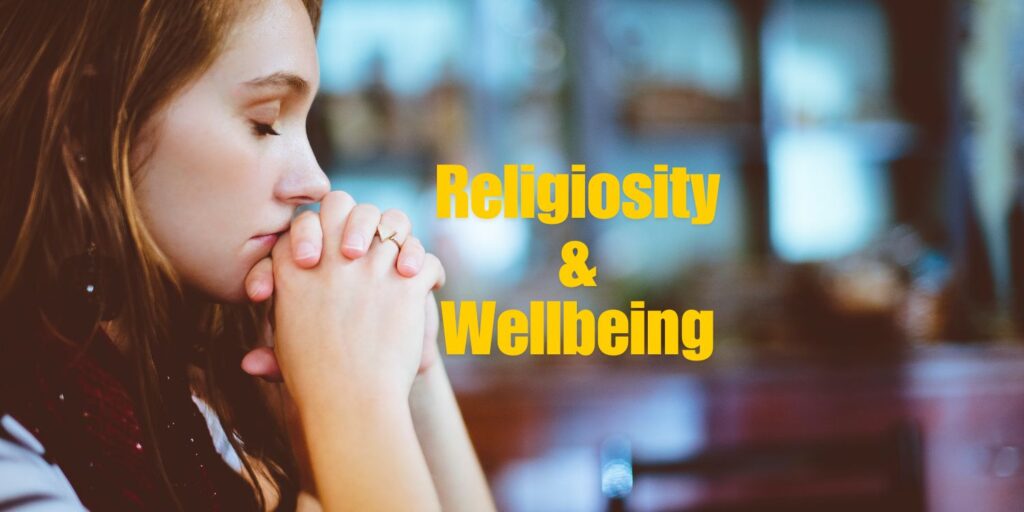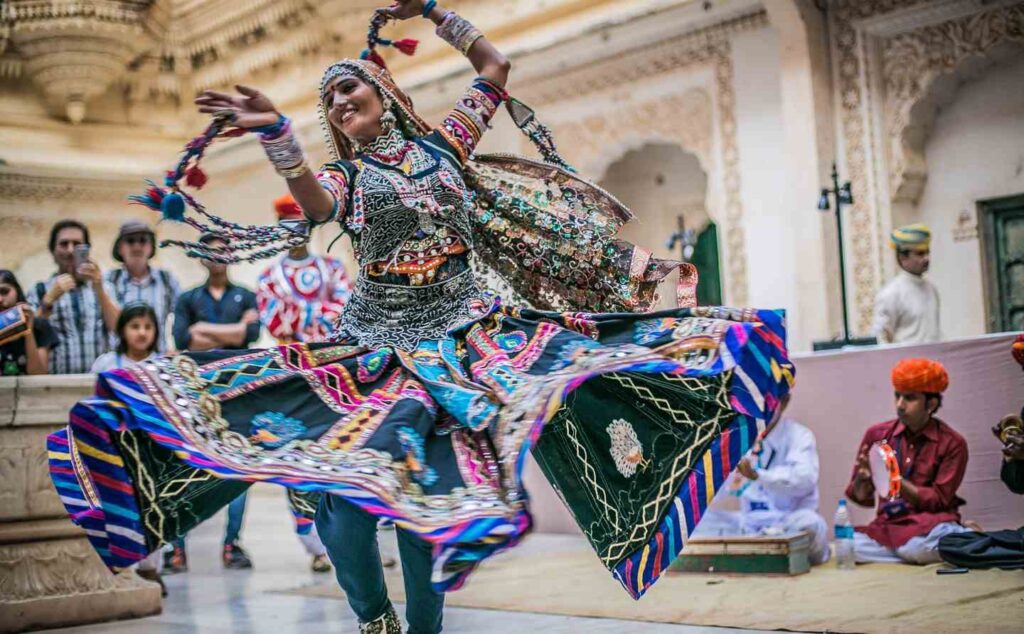
Table of Contents
Religiosity and Wellbeing
Religion is as old as the human civilization. These are just like the peanut butter and the jam – two inseparable duo we can’t help but remain fascinated about. From the dawn of humanity when our forefathers fathomed about the mysteries of human life while gazing the stars, religion guided them at every step. If we imagine our great, great ancestors experiencing the thunderstorms from their cages or the flickering fire rising up high, they must have pondered upon the first seeds of religion. “Must be someone high up in the skies, some power, powerful than us” – the first chat of the Homo sapiens about divinity.
And this continued millennia after millennia, as religion integrated further into the very discussions and fabric of the human civilizations. We see it colouring every aspect of our lives – morality, lifestyles, arts, politics and our personal identity as well.
Religion served as the cannon to answer the queries of all times. Why do we exist? What is our purpose? Why we are here? Who is responsible for the weather? Who makes the winds and the rains? Why do we die? What happens when we die? Etc. etc. Take for instance the Greek civilization. Their Gods are intriguing dipped in romantic opera – Venus and Mars caught in a net, Attis and Cybele’s bond of passion and divine significance.
The afterlife concept of ancient Egypt is a fascinating tale where even the dead are treated with pleasures and pearls; Hinduism’s departmental division of the Gods as the creator, destructor and caretaker of the world, and where Saraswati holds the division of education, while Laxmi bestows wealth.
Religion has remained humanity’s moral compass with commandments, teachings and tenets. These beliefs and practices found in Christianity, Buddhism and Islam aren’t just religious doctrines but are the ancient versions of the self-help books that guide people about how to live well and treat others kindly. Even the most atheist would also seek little divine intervention when the going gets tough. “Oh Lord! Where did I lose my keys? Help me find my marriage ring”.
That belief in something over there greater than ourselves is the comforting corner of religiosity for our wellbeing. Scholars suggest that religion cultivates social networks, gives meaning to life, inculcates healthy lifestyle choices.
However, in modern times where there is the rise of secularism and growth of spirituality outside traditional frameworks, defining the relationship between religiosity and our wellbeing is the question we confront. People may not have a strong definition about religion but meditate with apps on their phones. Meditation becomes their religion which defines their wellbeing and purpose in life. Hence, religiosity and wellbeing are intertwined in complex and fascinating ways.
The Empirical Evidence on Religiosity and Wellbeing
Empirical evidence suggests that religiosity and well-being are like Fred Astaire and Ginger Rogersinter (dance partners in Hollywood movies), always in sync and impressively graceful. Many studies suggest that people who involve themselves in regular religious practices report higher levels of satisfaction. It’s as if getting life time access to a health app with less subscription fees. It’s not astonishing to see why individuals having memberships in meditation gurukuls have a robust social network. Aristotle’s idea of eudaimonia, where wellbeing is about strong social bonds achieved through virtuous activities, is a perfect sync. Wouldn’t be wrong to say that divine dinners in community gatherings help stay mentally healthy.
Pew Research Centre study also highlights the positive relation between religious individuals and their lesser stress and anxiety levels. Regular meditative practices and prayers provide a sense of peace and purpose, acting like a spa treatment for many individuals. It’s no wonder that worries about bills and work deadlines and tension regarding branded choices, all melt away in the bright light of spiritual fulfilment.
While extrinsic religiosity gives bliss, some research reports state that intrinsic religiosity is more fulfilling even without any social perks or community meals. Existentialist philosopher Søren Kierkegaard would approve this philosophy while chuckling at the notion of faith being reduced to a mere membership club. Afterall, authenticity of belief and one’s engagement in purpose of life is paramount.
Religiosity and Wellbeing – The Other Side
Though studies point towards higher life satisfaction with religiosity, not all is sunshine and hymns. High dogmatism or fundamentalism can increase stress and anxiety level decreasing the wellbeing. Faith, when it turns into a source of division rather than unity, can negate all benefits.
Religiosity is synonymous to the chocolate cake that is best enjoyed when taken in balanced portions. Just as too many inspirational or self-help books can leave you confused; overzealous religiosity can become the brakes in life. Imagine attending weekly sermon lessons only to know that whatever we are doing is all wrong. Isn’t it like perpetually getting stuck in a traffic without any clue of what’s ahead? Strict doctrines can sometimes become an oppressive script, frustrating and draining our lives.
The existentialist argues that when religion becomes the source of fear, it overrides the true meaning of life. Extreme religiosity can make many people feel like Greek King Sisyphus eternally lifting the boulder to the mountain top. It also lowers self-esteem and increases depression, especially in those individuals who happen to frequently engage in guilt-tripping sessions. It activates the inner critic within that constantly demoralizes the soul by pointing out the faults. Philosopher Nietzsche, the critic of culture, would literally smirk thinking how guilt can be a potent weapon to constrain a human spirit rather than elevating him from the contexts of good and evil.
Added to this is the community pressure that coerce kith and kins into practicing religiosity thereby decreasing the overall happiness of otherwise free-spirited beings. Rightly demonstrated by Focault that social control can become invisible chains subtly stifling individuals free thinking and well-being. Sometimes the serene activity of praying can also backfire. Coerce any child absorbed in a computer game to pray and see what happens. The fear of divine retribution only makes an individual judgemental rather than bringing the spiritual tranquility within.
Lastly, it also has the power to rip you of the social circle that you always treasured. Broader societal norms in present times clashes hard with extreme religious views. At a time when people love talking about the latest Netflix shows, advocating morality can be a disastrous move enough to make you an outsider. It’s enough to make you feel like the “Knight of Infinite Resignation”.
Does Religiosity Enhance Wellbeing? The Conclusion
Religiosity is undoubtedly a source of joy and wellbeing in moderation. But it also has the flipsides hidden beneath its complex and multifaceted nature much like the soufflé that can either taste the best or become a mess. The sunny side, we see, is the sense of belonging to a robust social network easing out stress and giving a purpose and meaning to life. Its like having a spiritual GPS guiding through the turbulent traffic jams in your life path.
But the flip-side is its capacity to delimit improvisation when one starts memorizing the rigid script of dogmatic beliefs. The concept of “bad faith” can make individuals feel trapped in the roles and expectations that stifle their true selves. Fear of divinity and guilt can become the spiritual taxes one has to pay throughout. So, the true magic lies in balancing religiosity to usher in happiness. Embracing the positives viz. community and purpose while being mindful of the potential social pressure or rigidity is the cue. The pursuit of wellbeing is a deeply personal journey and one has to chart out the course with a open mind and curious heart always.


